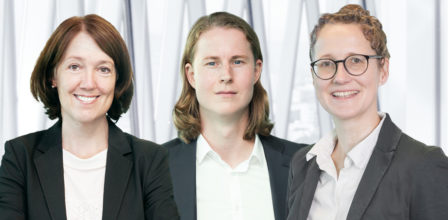Objectively measuring sustainability: “It’s about capturing the true impact of business on the environment and society.”
How can sustainable investing be objectively measured? This question is being asked by an increasing number of institutional investors who want to make their portfolios sustainable. Together with Effectual Capital, Quoniam is implementing a unique investment approach based on the sustainable return developed by Effectual. Andreas Gintschel, Managing Director of Effectual, and Jonathan Clenshaw, CSO & CMO of Quoniam, explain what makes this approach unique.

How do you assess the impact of the Effectual investment approach in the current environment?
Andreas Gintschel: To date, there is a lack of objective, comprehensible and complete criteria for sustainable investing. Sustainability is often viewed subjectively. With the sustainable return, Effectual creates a framework that meets the requirement of objectivity and thus offers institutional investors in particular a clear orientation for their sustainability strategy.
There are many sustainability strategies on the market. What exactly is special about your approach?
Andreas Gintschel: Many of the sustainable investing approaches to date have been reduced to one specific aspect, for example CO2. However, this does not go far enough to achieve a sustainable transformation of the economy. In addition to the CO2 footprint, a whole range of other factors are important, such as water and waste intensity or social aspects. Moreover, sustainability criteria and risk-return aspects have to be balanced. So you have to manage a lot of complexity. And this is exactly what we offer: The ability to objectively combine economic, environmental and social considerations.
Based on the theory of externalities, the costs and benefits to society of doing business are measured. Where does this idea come from?
Andreas Gintschel: It goes back to the British economist Arthur C. Pigou, so it has been known in economics for 100 years and is applied in many ways – including in environmental economics. The principle is simple: most of a company’s activities involve products and services for which there are market prices and which are therefore included in the economic calculation. What is not usually taken into account are the costs to society that a company causes, such as air pollution or the gender pay gap. These so-called externalities are passed on to society as a whole. This can be compensated for by internalisation, for example by means of a tax on CO2 emissions. There can also be positive externalities, i.e. benefits to society, when companies provide training, for example.
“The basis for a sustainable return is that externalities – i.e. the costs or benefits that companies create for society as a whole – are reflected in realistic prices. “

Andreas Gintschel
Managing Director Effectual
Jonathan Clenshaw: We are not alone, by the way. Since 2014, auditors have been developing similar concepts around externalities to make corporate sustainability reporting more comparable. In addition, the Big Four accountancy firms and a number of well-known companies have formed the Value Balancing Alliance to standardise sustainability reporting by assessing and monetising external impacts. This alliance includes household names such as BASF, BMW, Michelin and Novartis.
“There are at least 50 shades of green. Companies can’t be lumped together as green or brown. It is important to make a data-driven, holistic assessment.”

Jonathan Clenshaw
CSO & CMO Quoniam
How do you factor externalities into the investment concept?
Andreas Gintschel: We put a monetary value on the externalities caused by a company. To do this, we collect and aggregate as much data as possible from a variety of sources on the costs and benefits incurred. All of this is then fed into Quoniam’s “portfolio machine” to calculate the sustainable return. This consists of the classical financial return corrected for externalities.
Do you want to change the world single-handedly?
Andreas Gintschel: That would be presumptuous. We believe that our economic, scientific model can make a difference to the acceptance of sustainable investing. In fact, we hope that the basic idea will be replicated and that more and more players will invest sustainably in such an effective way.
What kind of data are part of the strategy?
Jonathan Clenshaw: The strategy looks at around 15 factors in the areas of greenhouse gases, air pollutants, waste, water, labour, education, society and tax compliance.
Will this be extended to other issues in the future?
Andreas Gintschel: Yes, we are working on including R&D spending, gender pay gap and supply chain issues, among others.
“The idea was to create a framework for sustainable investing that was objective, understandable and complete.”

Andreas Gintschel
Managing Director Effectual
What does Quoniam bring to the collaboration, and what role does Effectual play?
Jonathan Clenshaw: If you want to measure sustainability, you can’t get around big data. With the Effectual strategy, we perform more than 500,000 calculations per day, look at around 16,000 companies and evaluate more than 1,000 pieces of information per security from 27 databases. The methodology fits modularly into our systematic thematic investment process: Effectual provides us with an estimate of the costs or benefits to the environment and society in the form of externalities. Quoniam then calculates the traditional financial return and adds or subtracts the externalities provided by Effectual. We refer to the result as the ‘sustainable return’. The aim of the strategy is to maximise this sustainable return by overweighting and underweighting companies.
What connects Quoniam and Effectual?
Jonathan Clenshaw: We are united by our scientific approach. We do not act on gut instinct or ideology, but are guided by science to arrive at sound judgements.
We are also both pioneers. Quoniam is the pioneer of systematic investing in German-speaking countries, and Effectual is the pioneer in implementing a sustainable investing strategy based on the theory of externalities.
This collaboration is a good example of how we tailor our ESG data expertise to the needs of our clients, and we are delighted to have been chosen by Effectual as a partner for this collaboration.
“What Effectual and Quoniam have in common is that we are not driven by a gut feeling or ideology, but by facts. We are guided by science to arrive at sound judgements.”

Jonathan Clenshaw
CSO & CMO Quoniam
Andreas Gintschel: I can only confirm this. At Quoniam, we had the feeling of being understood from the very first meeting. There was an immediate vision of how we could implement this together.
Can this approach also be applied to other asset classes?
Andreas Gintschel: At the moment, our focus is on the portfolio of global equities in the Effectual Capital Fund – Global Sustainable Equities. But in principle, our approach can be extended to other asset classes such as fixed income or private markets.
Thank you very much for the interview.
Learn more on the Effectual Principle:


